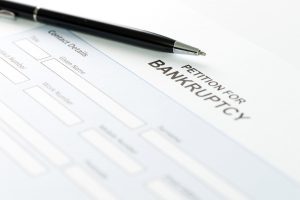
There are four types of bankruptcy that one can file for, depending on their situation, which include:
- Chapter 7;
- Chapter 11;
- Chapter 12; and
- Chapter 13.
Chapter 11 is a reorganization effort used by businesses and some individuals who are burdened by large sums of debt. Chapter 12 is solely reserved for family farmers. The two main types of bankruptcy options for individuals are Chapter 7 and Chapter 13.
Chapter 7 bankruptcy is also known as straight bankruptcy or liquidation. To file for Chapter 7, one must undergo the 2005 Bankruptcy Act Means Test. Here, the courts will observe a debtor’s average income for the six-month period prior to filing. The average income will then be compared to the median income for New Jersey residents and, if the debtor’s income falls below the median threshold, the debtor may file for Chapter 7. A bankruptcy trustee will gather and sell the debtors nonexempt property and assets and distribute the funds to the creditors.
If one does not qualify for Chapter 7, he or she may file for bankruptcy under Chapter 13. Chapter 13 is often referred to as a debt adjustment. Here, the debtor will be required to file a plan to pay debts (or parts, if applicable) from their current income. This plan is designed after regular monthly expenses are covered.
Once the proper documents are filed and the respective fees are paid, an automatic stay is enacted, which prohibits creditors from contacting the individual about unpaid debts. Also, a bankruptcy trustee will be appointed by the courts to oversee the debts and assure that each creditor will be paid as much as possible. A 341 Meeting of Creditors will be arranged for some creditors and the debtor to meet and discuss the repayment plan. Lastly, the debtor will appear before a bankruptcy judge to have their plan approved or denied.
Filing for bankruptcy is a difficult and strenuous process. If you are facing bankruptcy, it is best to contact an experienced New Jersey bankruptcy attorney to discuss your options. The Law Offices of Hunziker, Jones & Sweeney are experienced in helping families and individuals deal with the devastating effects of financial distress and in mapping out potential strategies, including the possibility of filing for bankruptcy, to help them cope and to see the light at the end of the tunnel. The attorneys at the firm understand that financial distress is an extremely emotional and difficult time for anyone to go through. If you are experiencing severe financial distress and may be considering bankruptcy as an option or want to learn more about what a bankruptcy filing may do to help you, call The Law Offices of Hunziker, Jones & Sweeney at (973) 256-0456 or fill out our contact form for a consultation.









